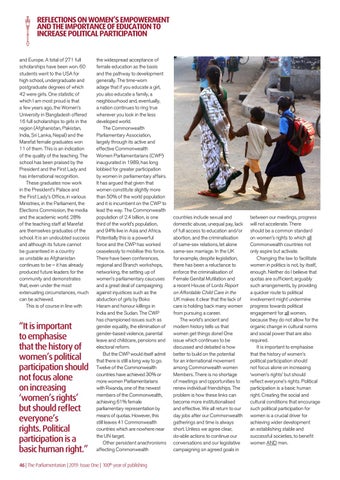REFLECTIONS ON WOMEN’S EMPOWERMENT AND THE IMPORTANCE OF EDUCATION TO INCREASE POLITICAL PARTICIPATION and Europe. A total of 271 full scholarships have been won. 60 students went to the USA for high school, undergraduate and postgraduate degrees of which 42 were girls. One statistic of which I am most proud is that a few years ago, the Women’s University in Bangladesh offered 16 full scholarships to girls in the region (Afghanistan, Pakistan, India, Sri Lanka, Nepal) and the Marefat female graduates won 11 of them. This is an indication of the quality of the teaching. The school has been praised by the President and the First Lady and has international recognition. These graduates now work in the President’s Palace and the First Lady’s Office, in various Ministries, in the Parliament, the Elections Commission, the media and the academic world. 28% of the teaching staff at Marefat are themselves graduates of the school. It is an undoubted success and although its future cannot be guaranteed in a country as unstable as Afghanistan continues to be – it has already produced future leaders for the community and demonstrates that, even under the most extenuating circumstances, much can be achieved. This is of course in line with
“It is important to emphasise that the history of women’s political participation should not focus alone on increasing ‘women’s rights’ but should reflect everyone’s rights. Political participation is a basic human right.”
the widespread acceptance of female education as the basis and the pathway to development generally. The time-worn adage that if you educate a girl, you also educate a family, a neighbourhood and, eventually, a nation continues to ring true wherever you look in the less developed world. The Commonwealth Parliamentary Association, largely through its active and effective Commonwealth Women Parliamentarians (CWP) inaugurated in 1989, has long lobbied for greater participation by women in parliamentary affairs. It has argued that given that women constitute slightly more than 50% of the world population and it is incumbent on the CWP to lead the way. The Commonwealth population of 2.4 billion, is one third of the world’s population, and 94% live in Asia and Africa. Potentially this is a powerful force and the CWP has worked ceaselessly to mobilise this force. There have been conferences, regional and Branch workshops, networking, the setting up of women’s parliamentary caucuses and a great deal of campaigning against injustices such as the abduction of girls by Boko Haram and honour killings in India and the Sudan. The CWP has championed issues such as gender equality, the elimination of gender-based violence, parental leave and childcare, pensions and electoral reform. But the CWP would itself admit that there is still a long way to go. Twelve of the Commonwealth countries have achieved 30% or more women Parliamentarians with Rwanda, one of the newest members of the Commonwealth, achieving 61% female parliamentary representation by means of quotas. However, this still leaves 41 Commonwealth countries which are nowhere near the UN target. Other persistent anachronisms affecting Commonwealth
46 | The Parliamentarian | 2019: Issue One | 100th year of publishing
countries include sexual and domestic abuse, unequal pay, lack of full access to education and/or abortion, and the criminalisation of same-sex relations, let alone same-sex marriage. In the UK for example, despite legislation, there has been a reluctance to enforce the criminalisation of Female Genital Mutilation and a recent House of Lords Report on Affordable Child Care in the UK makes it clear that the lack of care is holding back many women from pursuing a career. The world’s ancient and modern history tells us that women get things done! One issue which continues to be discussed and debated is how better to build on the potential for an international movement among Commonwealth women Members. There is no shortage of meetings and opportunities to renew individual friendships. The problem is how these links can become more institutionalised and effective. We all return to our day jobs after our Commonwealth gatherings and time is always short. Unless we agree clear, do-able actions to continue our conversations and our legislative campaigning on agreed goals in
between our meetings, progress will not accelerate. There should be a common standard on women’s rights to which all Commonwealth countries not only aspire but activate. Changing the law to facilitate women in politics is not, by itself, enough. Neither do I believe that quotas are sufficient; arguably such arrangements, by providing a quicker route to political involvement might undermine progress towards political engagement for all women, because they do not allow for the organic change in cultural norms and social power that are also required. It is important to emphasise that the history of women’s political participation should not focus alone on increasing ‘women’s rights’ but should reflect everyone’s rights. Political participation is a basic human right. Creating the social and cultural conditions that encourage such political participation for women is a crucial driver for achieving wider development an establishing stable and successful societies, to benefit women AND men.
